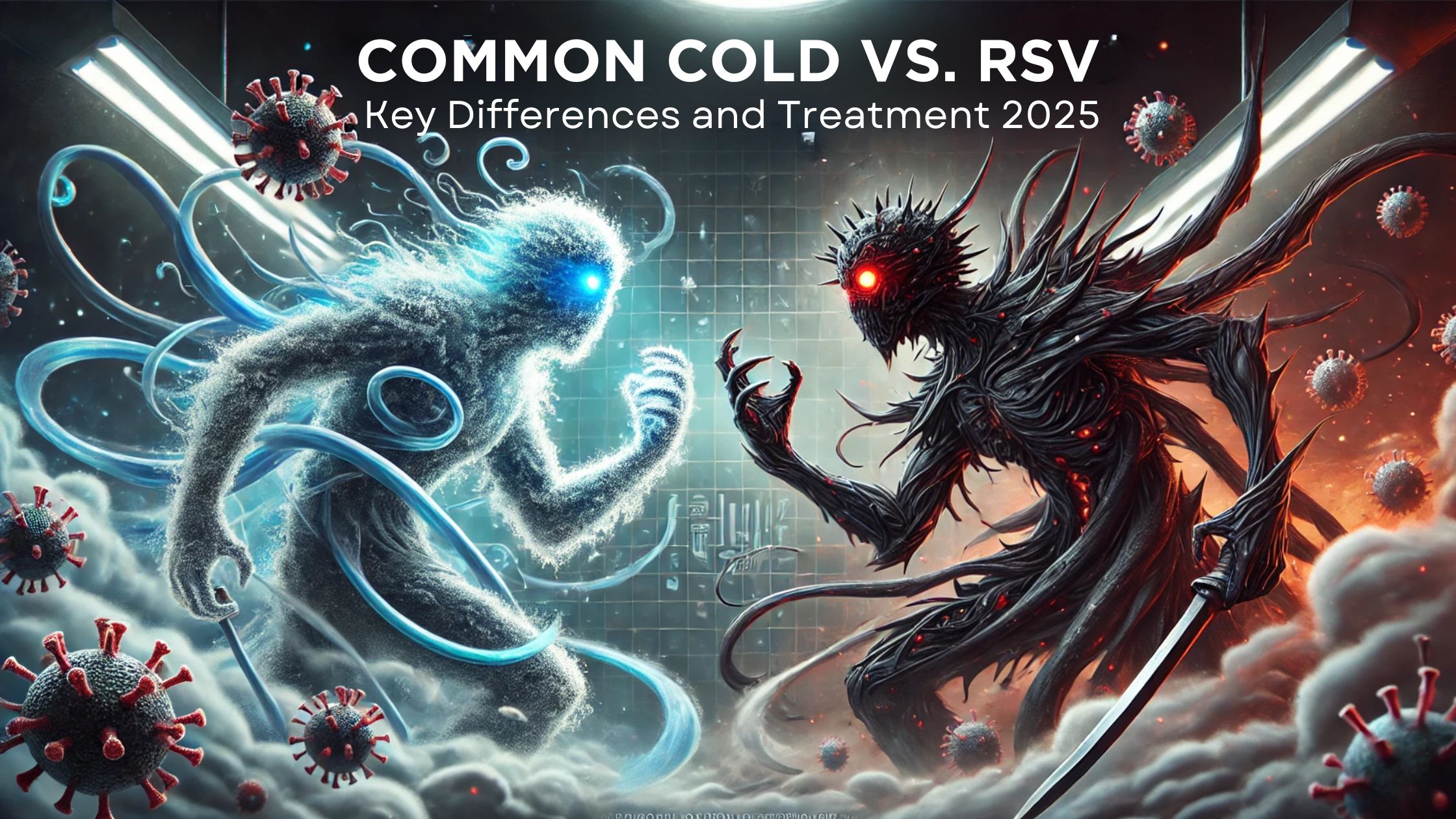Common Cold vs RSV: The onset of respiratory symptoms often leads to a common question like is it just the common cold or
something more serious like Respiratory Syncytial Virus (RSV)?
Understanding the differences between these two can be crucial, especially in managing symptoms and seeking appropriate care.
Key Takeaways:
Common cold and RSV have overlapping symptoms but differ in severity and risk groups.
RSV is more likely to cause severe respiratory issues, especially in infants and the elderly.
Effective management involves understanding symptoms, prevention strategies, and when to seek medical help.
Key Differences Between Common Cold and RSV
What is the Common Cold?
The common cold, predominantly caused by the rhinovirus, is a mild viral infection of the upper respiratory tract. It’s characterized by symptoms like a runny nose, sore throat, coughing, and sneezing.
Symptoms
- Runny nose
- Sneezing
- Sore throat
- Mild cough
Over-the-counter medications and rest are usually sufficient for treatment.
However, it is important to stay hydrated and maintain good hygiene to prevent the spread of the virus.
What is RSV?
Respiratory Syncytial Virus (RSV) is a common respiratory virus that causes mild, cold-like symptoms in adults and older children but can be more severe in infants and the elderly.
A recent study published in the Canada Communicable Disease Report highlights the significant impact of Respiratory Syncytial Virus (RSV) on older adults and those at high risk in Canada.
Prevalence: RSV accounts for approximately 4.7% to 7.8% of symptomatic respiratory tract infections in adults aged 60 and older.
Increased Risk with Age and Comorbidities: The incidence of RSV-related respiratory infections rises with age and is higher among individuals with underlying medical conditions.
Severe Outcomes in Long-Term Care Residents: Older adults residing in long-term care or chronic care facilities are more likely to experience severe clinical outcomes from RSV compared to those living independently.
Hospitalization and ICU Admission Rates: Approximately 10% of older adults hospitalized due to RSV require admission to intensive care units.
Mortality Rate: The case fatality ratio among hospitalized older adults with RSV infection ranges between 5% and 10%.
Comparing the Common Cold and RSV
Symptom Comparison
While both conditions share symptoms like coughing and congestion, RSV tends to present more severe respiratory symptoms, such as wheezing and difficulty breathing.
Treatment Approaches
Treatment for the common cold focuses on symptom relief, while RSV may require hospitalization in severe cases, especially for high-risk groups. [Source]
Prevention Strategies
Preventing Common Cold and RSV: Prevention strategies for both conditions include regular handwashing, avoiding close contact with infected individuals, and keeping surfaces clean.
Vaccination and Immunity: While there’s no vaccine for the common cold, RSV vaccines are available for high-risk groups.
Boosting one’s immune system through a balanced diet and regular exercise can also help.
Navigating Through the Cold and RSV Season
When to See a Doctor
If symptoms worsen it is imperative to consult a healthcare provider for a tailored treatment plan. For that click on the link given below.
[button text=”Consult Now” style=”shade” radius=”5″ depth=”3″ depth_hover=”5″ expand=”true” visibility=”show-for-small”]
[ux_banner height=”500px” bg=”25692″ bg_color=”#4ea799″ link=”https://123walkinclinic.com/locations/” target=”_blank” visibility=”hide-for-small”]
[text_box text_color=”dark” width=”40″ width__sm=”60″ padding=”30px 30px 30px 30px” position_x=”5″ position_y=”50″ text_align=”left” bg=”rgb(255, 255, 255)” depth=”3″]
Doctor Consultation
Expert Care, Always Ready
Experience top-tier medical services with a team of Canada’s best doctors. From general advice to specific advice.
[button text=”book now” expand=”true” link=”https://123walkinclinic.com/locations/” target=”_blank”]
[/text_box]
[/ux_banner]
Managing Symptoms at Home
Home remedies like steam inhalation, warm fluids, and rest can be effective in managing mild symptoms of both the common cold and RSV.
Symptom Comparison
| Symptom | Common Cold | RSV |
| Cough | Mild | Often severe |
| Fever | Rare | More common |
| Wheezing | Rare | Common in severe cases |
| Runny Nose | Common | Common |
| Sore Throat | Common | Less common |
Understanding the Impact on Different Age Groups
Children and Infants
- More susceptible to severe RSV.
- The common cold is usually mild.
Adults and Elderly
- Higher risk of severe RSV complications.
- Common cold symptoms are typically mild.
Advanced Prevention Strategies
Boosting Immunity
- Balanced diet: Rich in vitamins and minerals.
- Regular exercise: Strengthens the immune system.
- Adequate sleep: Essential for immune function.
Environmental Controls
- Air filtration: To reduce airborne pathogens.
- Humidity control: Dry air can exacerbate respiratory symptoms.
Impact on Different Populations
| Age Group | Common Cold | RSV |
| Infants | Mild | High Risk |
| Children | Mild to Moderate | Moderate to High Risk |
| Adults | Mild | Moderate Risk |
| Elderly | Mild to Moderate | High Risk |
Preventing Misdiagnosis
| Symptom | Common Cold | RSV | Action Required |
| Fever | Rare | Common | Seek medical advice |
| Severe Cough | Uncommon | Common | Monitor closely |
| Wheezing | Rare | Common in severe cases | Medical evaluation needed |
| Runny Nose | Common | Common | Home care is usually sufficient |
Frequently Asked Questions
Q1: Can adults get RSV?
A: Yes, adults can get RSV, though symptoms are generally milder compared to children.
Q2: How long does RSV last?
A: RSV symptoms typically last about 7-14 days.
Q3: Can RSV lead to other complications?
A: Yes, especially in high-risk groups, RSV can lead to pneumonia and other serious respiratory complications.
